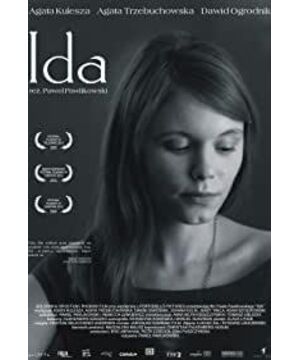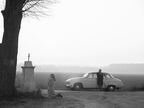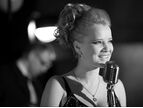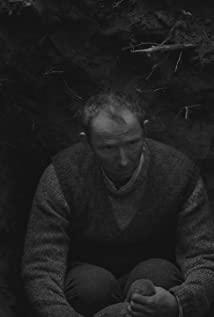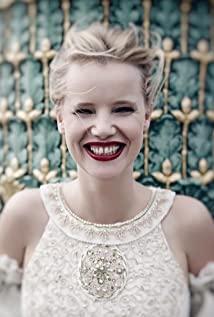This is the second black and white film I've watched this year. Like the "Nabraska" I watched before, the 4:3 ratio film uses a lot of thick and thin lines and contrasts of light and shadow to frame its breathtakingly beautiful scenery. Especially in pictures such as snow and Jesus statues, the existence of the characters is even more insignificant compared with the huge and empty environment. These still pictures-like scenery pictures are so beautiful that the viewers can stare at them for a long time, but they are too much. Strong and continuous interference with people's sight and emotional input, people can't focus or even immerse in the plot, they can only keep enough distance to stare, just like Ida in the movie.
Ida in the film is an individual with a sense of alienation: his eyes are flat, his expression is poor, and his little dialogue often shows no interest in life and others. She is a "saint", and her status as a nun and her expressionless face always remind the audience of her secret sense of alienation from the world. In Wanda's eyes, her "glamorous dimples" never seem to actually appear in the film. As Wanda tells her about her parents, Ida, played by Trzebuchowska, remains expressionless, only the subtle movements of her hands on the table reveal the emotions that may be surging inside her. On the way to the cemetery of her parents, Ida stared at Wanda's vivid way of life as an indifferent bystander: tobacco, alcohol, music, flirting, which made the "Red Wanda" who should represent the indifferent judgment regime become a Ordinary people full of carnal desires. Ida stares at her manic knocking on the door when she visits Szymon, and breaks down crying after asking about the circumstances of her son's death... Ida doesn't seem to be fully emotionally recognizing her identity in the journey of finding her own life. She stares, explores, thinks, and even hesitates occasionally (she takes off her turban in front of the mirror and scatters her hair), but she doesn't completely withdraw from her indifferent nun status. In the scene where Wanda sends Ida back to the monastery again, the director gives Ida and Wanda a long still shot, they keep the right distance from each other and stare at each other for a long time, which also seems to show Ida Distance from Wanda's identity and life: They meet for a moment, but they are destined to be separated for a long time.
Wanda's death seems to have accelerated Ida's changes in her self-identity. And this change is especially evident in a shot of Ida in a monastery before Wanda's death. Ida, who was working in the kitchen, kept her eyes on the body of another nun who was bathing in the other corner of the room. At that moment, the nun who was bathing in the lens of Ida's line of sight was wearing single clothes, but she showed a sense of violation of the holy monastery. Harmony's secret erotic breath, at this moment Ida's gaze finally broke away from the holy "abstinence" identity, as if slowly ascending the steps from the religious altar, towards the world.
Ida's last long stare was left to the saxophone boy after she had tasted eroticism as she sorted out her nun's clothes in the hallway of the room. This gaze highlights an obvious sense of spatial distance due to the director's camera position, but Ida's eyes are no longer as indifferent and alienated as in the opening scene of the movie under this non-negligible distance. It is not as warm as it is, but it is no longer as cold as frost. But Ida finally pulled away after leaving this stare. She once again refused to devote herself to the world and chose to go on the road alone.
Yes, this is the look back on history - we explore, seek, understand and record the past, but like Ida who cannot immerse himself in the past, we can only withdraw and leave, no matter where we go, and in the end, only that is left. A long stare.
View more about Ida reviews


